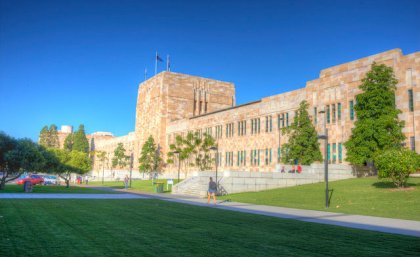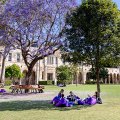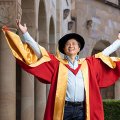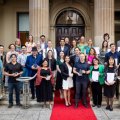
The University of Queensland has held its position in the top 100 universities globally, according to the Academic Ranking of World Universities for 2014, announced today.
UQ is ranked at 85 in the world for the second consecutive year, the highest it has been in this prestigious research-based ranking, and third highest in Australia.
The University improved its rankings in the field of life and agriculture sciences, where it rose three places to be ranked 37th in the world.
UQ Vice-Chancellor and President Professor Peter Høj said the result reflected the excellence and strong dedication of the University’s researchers.
“UQ has raw research power across a plethora of fields that are integral to national priorities, and that benefit people, the environment and economies worldwide,” Professor Høj said.
“Being 85 for two years running is a particularly pleasing result because competition for top places is intensified by major investments in higher education and research elsewhere.
“Other Australian universities face the same tough conditions, and investments to retain and further improve the position of Australian universities must be made – especially as these rankings influence Australia’s international reputation and the health of our $15.7 billion education exports industry.”
In today’s rankings, UQ improved to a top-100 position in the social sciences field and maintained its top 100 positions in the fields of clinical medicine and pharmacy, and engineering/technology and computer sciences (in the 76-100 band).
The Center for World-Class Universities at Shanghai Jiao Tong University has published the ARWU annually since 2003. It is a widely referenced and influential ranking of the world's research universities and ranks more than 1000 universities, with the top 500 published at http://www.shanghairanking.com/index.html
It is compiled using objective indicators including:
• number of alumni and staff winning Nobel Prizes and Fields Medals
• number of highly cited researchers selected by Thomson Scientific
• number of articles published in journals of Nature and Science
• number of articles indexed in Science Citation Index - Expanded and Social Sciences Citation Index
• per capita performance with respect to the size of an institution.
Professor Høj said that although the ARWU ranking was research-based, it had very positive implications for students at all levels of study.
“Students immersed in a research-inspired culture will value the application of excellence to solve problems, and will have greater confidence to tackle complex and unexpected issues as they build their careers,” he said.
However he cautioned that Australia’s position could not be taken for granted, if universities are not properly resourced and given freedom to match it with the best in the world.
“Any signs that a number of Australia’s leading research-intensive universities are losing ground should not be taken lightly,” Professor Høj said.
The 2014 ARWU table corroborates other global indices that rank UQ in the top one per cent of universities globally, as well as in particular fields.
They include the QS World University Rankings 2013 (UQ 43); Times Higher Education World University Rankings 2013-2014 (rank 63); and 2013 Performance Ranking of Scientific Papers for World Universities (rank 67).
Media: Fiona Cameron, UQ Communications, f.cameron2@uq.edu.au or 07 3365 1120.











